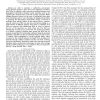Free Online Productivity Tools
i2Speak
i2Symbol
i2OCR
iTex2Img
iWeb2Print
iWeb2Shot
i2Type
iPdf2Split
iPdf2Merge
i2Bopomofo
i2Arabic
i2Style
i2Image
i2PDF
iLatex2Rtf
Sci2ools
WCNC
2010
IEEE
2010
IEEE
Hedonic Coalition Formation Games for Secondary Base Station Cooperation in Cognitive Radio Networks
— In order to maintain a conflict-free environment among licensed primary users (PUs) and unlicensed secondary users (SUs) in cognitive radio networks, providing frequency and geographical information through control channels, such as the cognitive pilot channel (CPC), has been recently proposed. While existing literature focused on the type of information that these control channels need to carry, this paper investigates the problem of gathering this information cooperatively, among a network of secondary base stations (SBSs). In this regard, given a cognitive network where every SBS can only have accurate knowledge on a small number of different primary users (PUs) or channels, each SBS can cooperate with neighboring SBSs in order to improve its view of the spectrum, i.e., learn about new PUs that can subsequently be used by its served SUs. We model the problem as a hedonic coalition formation game among the SBSs and we propose an algorithm for forming the coalitions. Using the pr...
| Added | 16 Aug 2010 |
| Updated | 16 Aug 2010 |
| Type | Conference |
| Year | 2010 |
| Where | WCNC |
| Authors | Walid Saad, Zhu Han, Tamer Basar, Are Hjørungnes, Ju Bin Song |
Comments (0)

